NURSING 5: Nursing Standards and Safe Practice Report
VerifiedAdded on 2022/09/15
|6
|1360
|21
Report
AI Summary
This report examines the Nursing and Midwifery Board of Australia's Registered Nurse Standards for Practice, focusing on Standard 6: Provides Safe, Appropriate and Responsive Quality Nursing Practice. The report explores three key criteria: practicing within the scope of practice, providing effective delegation and supervision, and adhering to relevant nursing guidelines, regulations, and legislation. It defines the scope of practice, emphasizing the importance of patient needs and quality health outcomes, and discusses independent, dependent, and interdependent nursing functions. The report highlights the RN's responsibility in delegation, ensuring timely decisions and proper supervision for safe and correct practice. It also emphasizes the importance of following nursing standards, legislations, and guidelines to ensure patient safety and quality health outcomes. The report concludes by stressing the importance of adhering to these standards to ensure patient safety and promote quality healthcare.
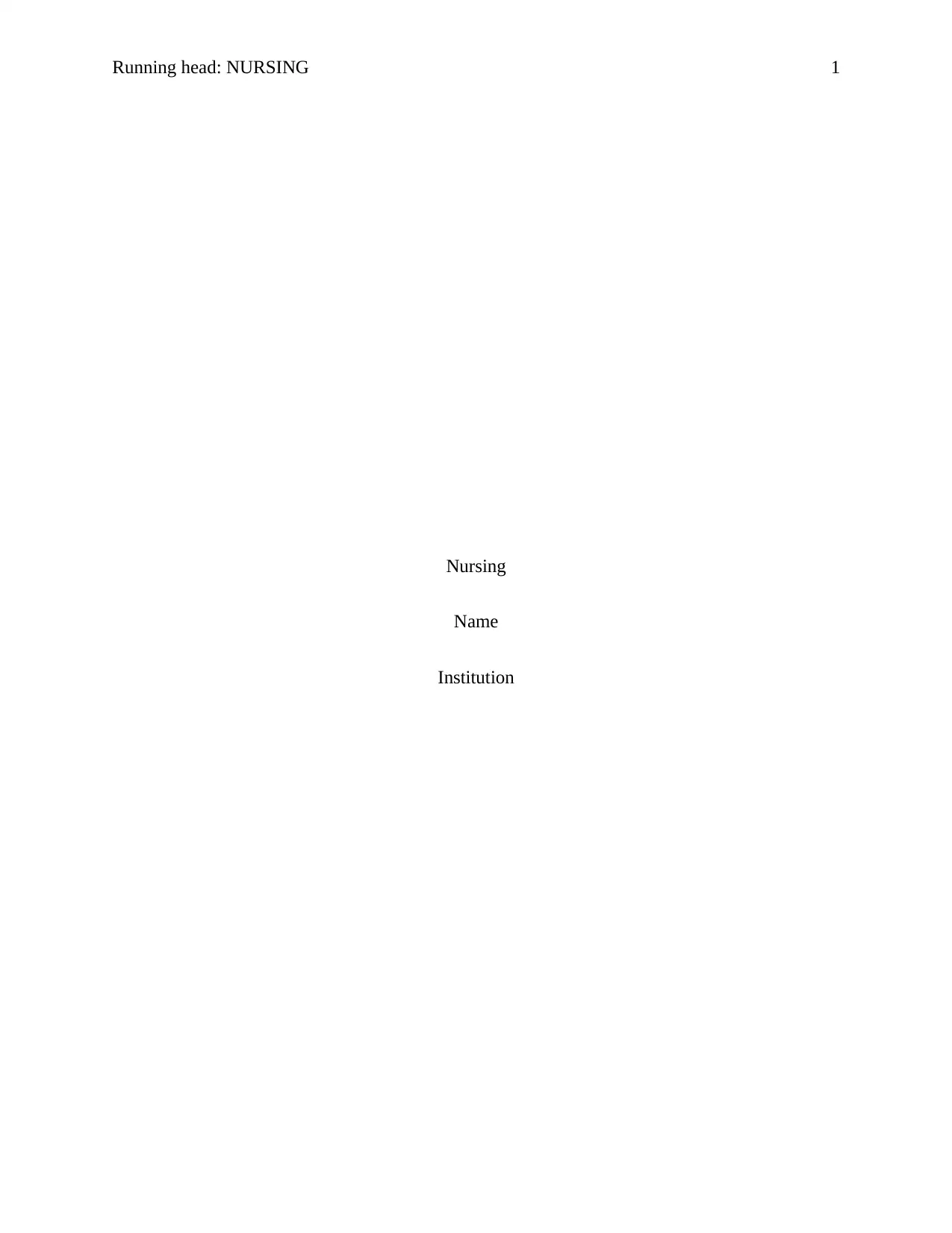
Running head: NURSING 1
Nursing
Name
Institution
Nursing
Name
Institution
Paraphrase This Document
Need a fresh take? Get an instant paraphrase of this document with our AI Paraphraser
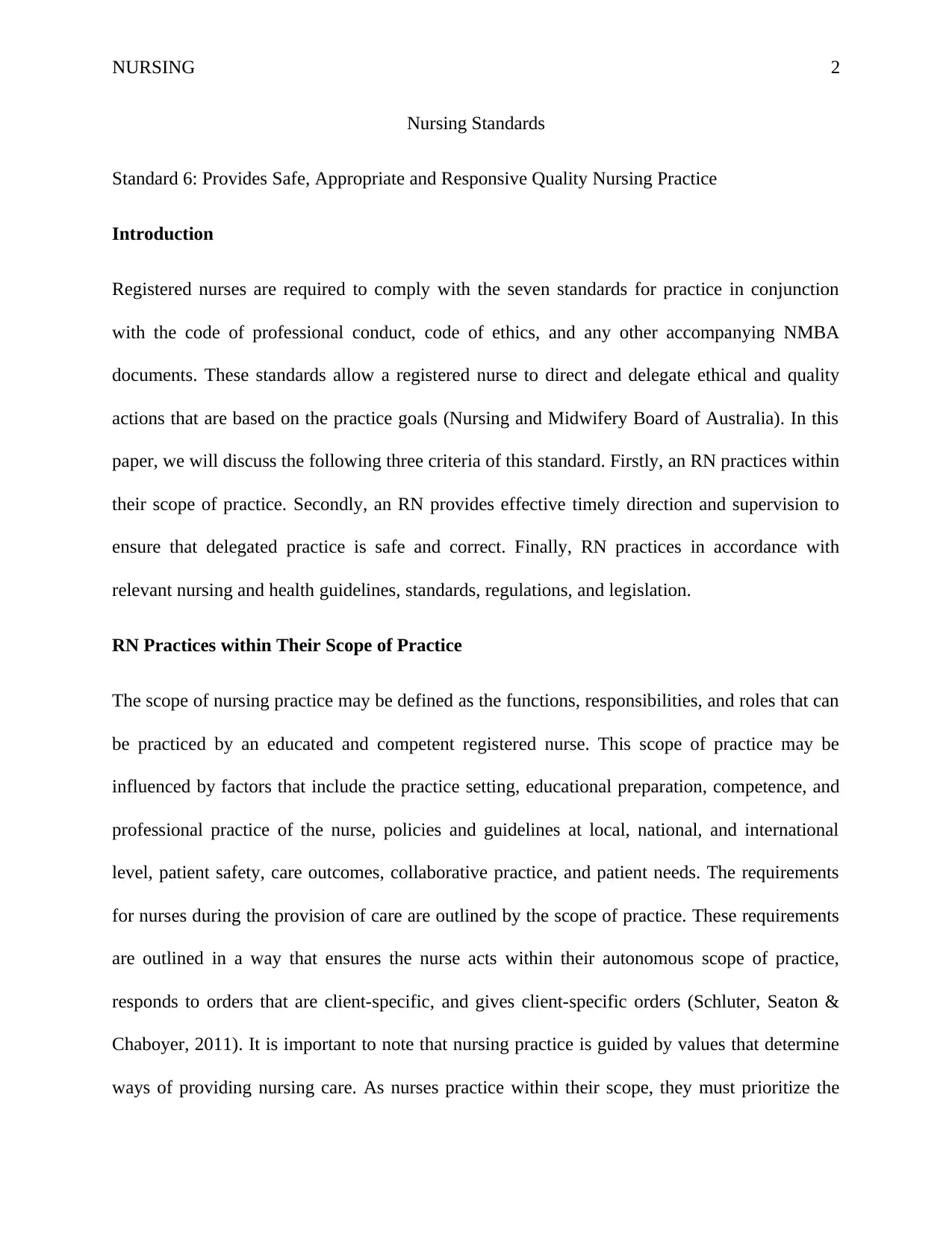
NURSING 2
Nursing Standards
Standard 6: Provides Safe, Appropriate and Responsive Quality Nursing Practice
Introduction
Registered nurses are required to comply with the seven standards for practice in conjunction
with the code of professional conduct, code of ethics, and any other accompanying NMBA
documents. These standards allow a registered nurse to direct and delegate ethical and quality
actions that are based on the practice goals (Nursing and Midwifery Board of Australia). In this
paper, we will discuss the following three criteria of this standard. Firstly, an RN practices within
their scope of practice. Secondly, an RN provides effective timely direction and supervision to
ensure that delegated practice is safe and correct. Finally, RN practices in accordance with
relevant nursing and health guidelines, standards, regulations, and legislation.
RN Practices within Their Scope of Practice
The scope of nursing practice may be defined as the functions, responsibilities, and roles that can
be practiced by an educated and competent registered nurse. This scope of practice may be
influenced by factors that include the practice setting, educational preparation, competence, and
professional practice of the nurse, policies and guidelines at local, national, and international
level, patient safety, care outcomes, collaborative practice, and patient needs. The requirements
for nurses during the provision of care are outlined by the scope of practice. These requirements
are outlined in a way that ensures the nurse acts within their autonomous scope of practice,
responds to orders that are client-specific, and gives client-specific orders (Schluter, Seaton &
Chaboyer, 2011). It is important to note that nursing practice is guided by values that determine
ways of providing nursing care. As nurses practice within their scope, they must prioritize the
Nursing Standards
Standard 6: Provides Safe, Appropriate and Responsive Quality Nursing Practice
Introduction
Registered nurses are required to comply with the seven standards for practice in conjunction
with the code of professional conduct, code of ethics, and any other accompanying NMBA
documents. These standards allow a registered nurse to direct and delegate ethical and quality
actions that are based on the practice goals (Nursing and Midwifery Board of Australia). In this
paper, we will discuss the following three criteria of this standard. Firstly, an RN practices within
their scope of practice. Secondly, an RN provides effective timely direction and supervision to
ensure that delegated practice is safe and correct. Finally, RN practices in accordance with
relevant nursing and health guidelines, standards, regulations, and legislation.
RN Practices within Their Scope of Practice
The scope of nursing practice may be defined as the functions, responsibilities, and roles that can
be practiced by an educated and competent registered nurse. This scope of practice may be
influenced by factors that include the practice setting, educational preparation, competence, and
professional practice of the nurse, policies and guidelines at local, national, and international
level, patient safety, care outcomes, collaborative practice, and patient needs. The requirements
for nurses during the provision of care are outlined by the scope of practice. These requirements
are outlined in a way that ensures the nurse acts within their autonomous scope of practice,
responds to orders that are client-specific, and gives client-specific orders (Schluter, Seaton &
Chaboyer, 2011). It is important to note that nursing practice is guided by values that determine
ways of providing nursing care. As nurses practice within their scope, they must prioritize the
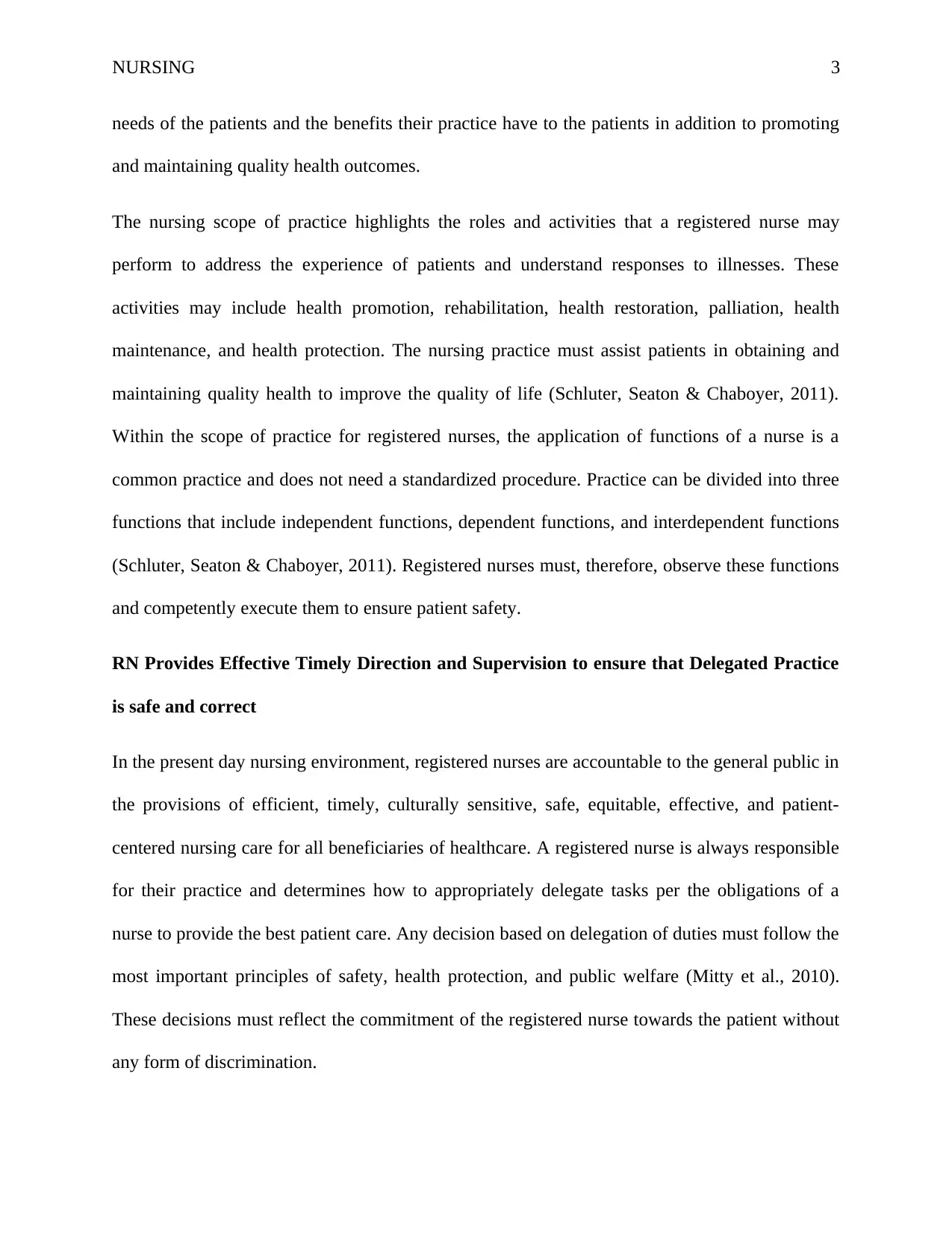
NURSING 3
needs of the patients and the benefits their practice have to the patients in addition to promoting
and maintaining quality health outcomes.
The nursing scope of practice highlights the roles and activities that a registered nurse may
perform to address the experience of patients and understand responses to illnesses. These
activities may include health promotion, rehabilitation, health restoration, palliation, health
maintenance, and health protection. The nursing practice must assist patients in obtaining and
maintaining quality health to improve the quality of life (Schluter, Seaton & Chaboyer, 2011).
Within the scope of practice for registered nurses, the application of functions of a nurse is a
common practice and does not need a standardized procedure. Practice can be divided into three
functions that include independent functions, dependent functions, and interdependent functions
(Schluter, Seaton & Chaboyer, 2011). Registered nurses must, therefore, observe these functions
and competently execute them to ensure patient safety.
RN Provides Effective Timely Direction and Supervision to ensure that Delegated Practice
is safe and correct
In the present day nursing environment, registered nurses are accountable to the general public in
the provisions of efficient, timely, culturally sensitive, safe, equitable, effective, and patient-
centered nursing care for all beneficiaries of healthcare. A registered nurse is always responsible
for their practice and determines how to appropriately delegate tasks per the obligations of a
nurse to provide the best patient care. Any decision based on delegation of duties must follow the
most important principles of safety, health protection, and public welfare (Mitty et al., 2010).
These decisions must reflect the commitment of the registered nurse towards the patient without
any form of discrimination.
needs of the patients and the benefits their practice have to the patients in addition to promoting
and maintaining quality health outcomes.
The nursing scope of practice highlights the roles and activities that a registered nurse may
perform to address the experience of patients and understand responses to illnesses. These
activities may include health promotion, rehabilitation, health restoration, palliation, health
maintenance, and health protection. The nursing practice must assist patients in obtaining and
maintaining quality health to improve the quality of life (Schluter, Seaton & Chaboyer, 2011).
Within the scope of practice for registered nurses, the application of functions of a nurse is a
common practice and does not need a standardized procedure. Practice can be divided into three
functions that include independent functions, dependent functions, and interdependent functions
(Schluter, Seaton & Chaboyer, 2011). Registered nurses must, therefore, observe these functions
and competently execute them to ensure patient safety.
RN Provides Effective Timely Direction and Supervision to ensure that Delegated Practice
is safe and correct
In the present day nursing environment, registered nurses are accountable to the general public in
the provisions of efficient, timely, culturally sensitive, safe, equitable, effective, and patient-
centered nursing care for all beneficiaries of healthcare. A registered nurse is always responsible
for their practice and determines how to appropriately delegate tasks per the obligations of a
nurse to provide the best patient care. Any decision based on delegation of duties must follow the
most important principles of safety, health protection, and public welfare (Mitty et al., 2010).
These decisions must reflect the commitment of the registered nurse towards the patient without
any form of discrimination.
⊘ This is a preview!⊘
Do you want full access?
Subscribe today to unlock all pages.

Trusted by 1+ million students worldwide
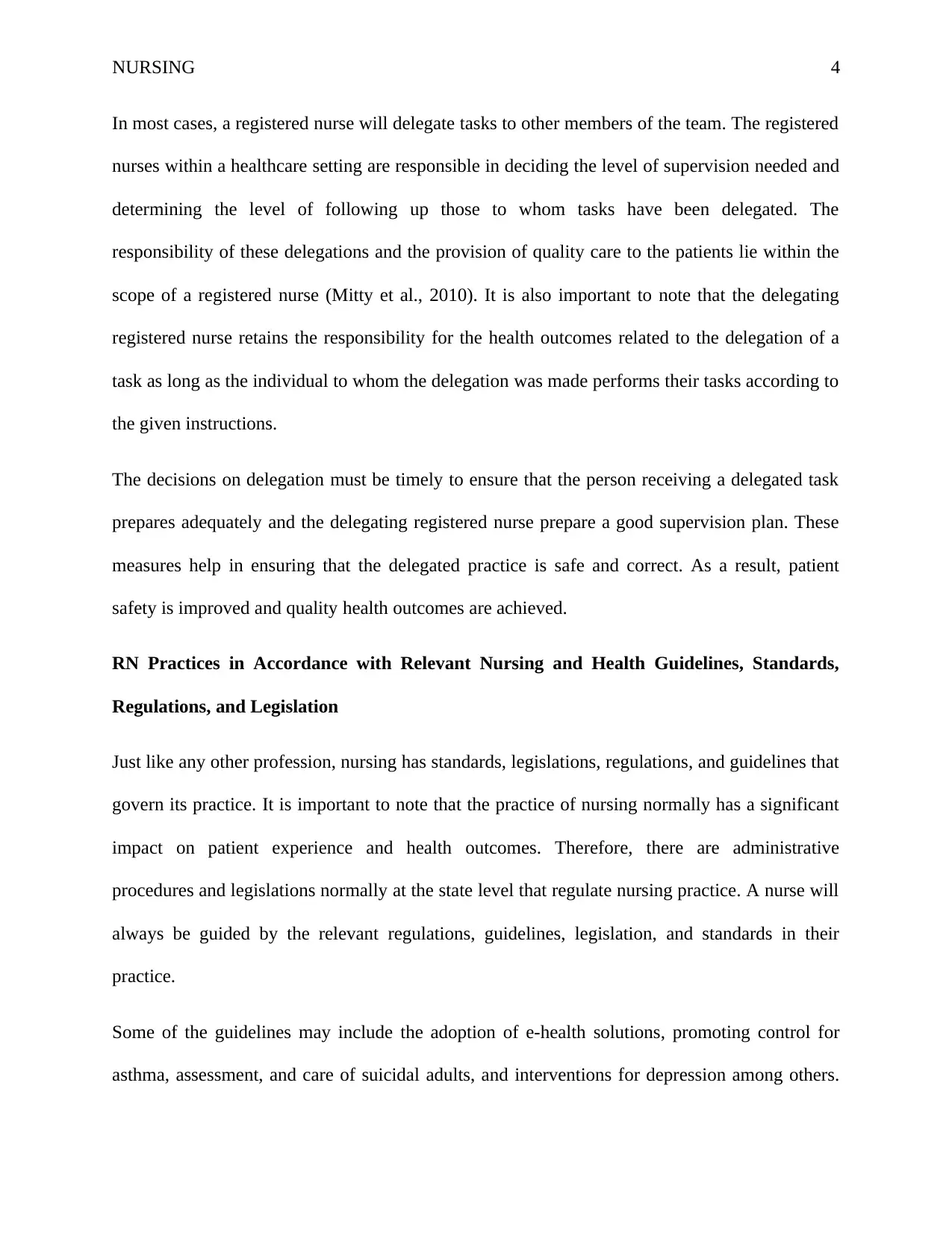
NURSING 4
In most cases, a registered nurse will delegate tasks to other members of the team. The registered
nurses within a healthcare setting are responsible in deciding the level of supervision needed and
determining the level of following up those to whom tasks have been delegated. The
responsibility of these delegations and the provision of quality care to the patients lie within the
scope of a registered nurse (Mitty et al., 2010). It is also important to note that the delegating
registered nurse retains the responsibility for the health outcomes related to the delegation of a
task as long as the individual to whom the delegation was made performs their tasks according to
the given instructions.
The decisions on delegation must be timely to ensure that the person receiving a delegated task
prepares adequately and the delegating registered nurse prepare a good supervision plan. These
measures help in ensuring that the delegated practice is safe and correct. As a result, patient
safety is improved and quality health outcomes are achieved.
RN Practices in Accordance with Relevant Nursing and Health Guidelines, Standards,
Regulations, and Legislation
Just like any other profession, nursing has standards, legislations, regulations, and guidelines that
govern its practice. It is important to note that the practice of nursing normally has a significant
impact on patient experience and health outcomes. Therefore, there are administrative
procedures and legislations normally at the state level that regulate nursing practice. A nurse will
always be guided by the relevant regulations, guidelines, legislation, and standards in their
practice.
Some of the guidelines may include the adoption of e-health solutions, promoting control for
asthma, assessment, and care of suicidal adults, and interventions for depression among others.
In most cases, a registered nurse will delegate tasks to other members of the team. The registered
nurses within a healthcare setting are responsible in deciding the level of supervision needed and
determining the level of following up those to whom tasks have been delegated. The
responsibility of these delegations and the provision of quality care to the patients lie within the
scope of a registered nurse (Mitty et al., 2010). It is also important to note that the delegating
registered nurse retains the responsibility for the health outcomes related to the delegation of a
task as long as the individual to whom the delegation was made performs their tasks according to
the given instructions.
The decisions on delegation must be timely to ensure that the person receiving a delegated task
prepares adequately and the delegating registered nurse prepare a good supervision plan. These
measures help in ensuring that the delegated practice is safe and correct. As a result, patient
safety is improved and quality health outcomes are achieved.
RN Practices in Accordance with Relevant Nursing and Health Guidelines, Standards,
Regulations, and Legislation
Just like any other profession, nursing has standards, legislations, regulations, and guidelines that
govern its practice. It is important to note that the practice of nursing normally has a significant
impact on patient experience and health outcomes. Therefore, there are administrative
procedures and legislations normally at the state level that regulate nursing practice. A nurse will
always be guided by the relevant regulations, guidelines, legislation, and standards in their
practice.
Some of the guidelines may include the adoption of e-health solutions, promoting control for
asthma, assessment, and care of suicidal adults, and interventions for depression among others.
Paraphrase This Document
Need a fresh take? Get an instant paraphrase of this document with our AI Paraphraser
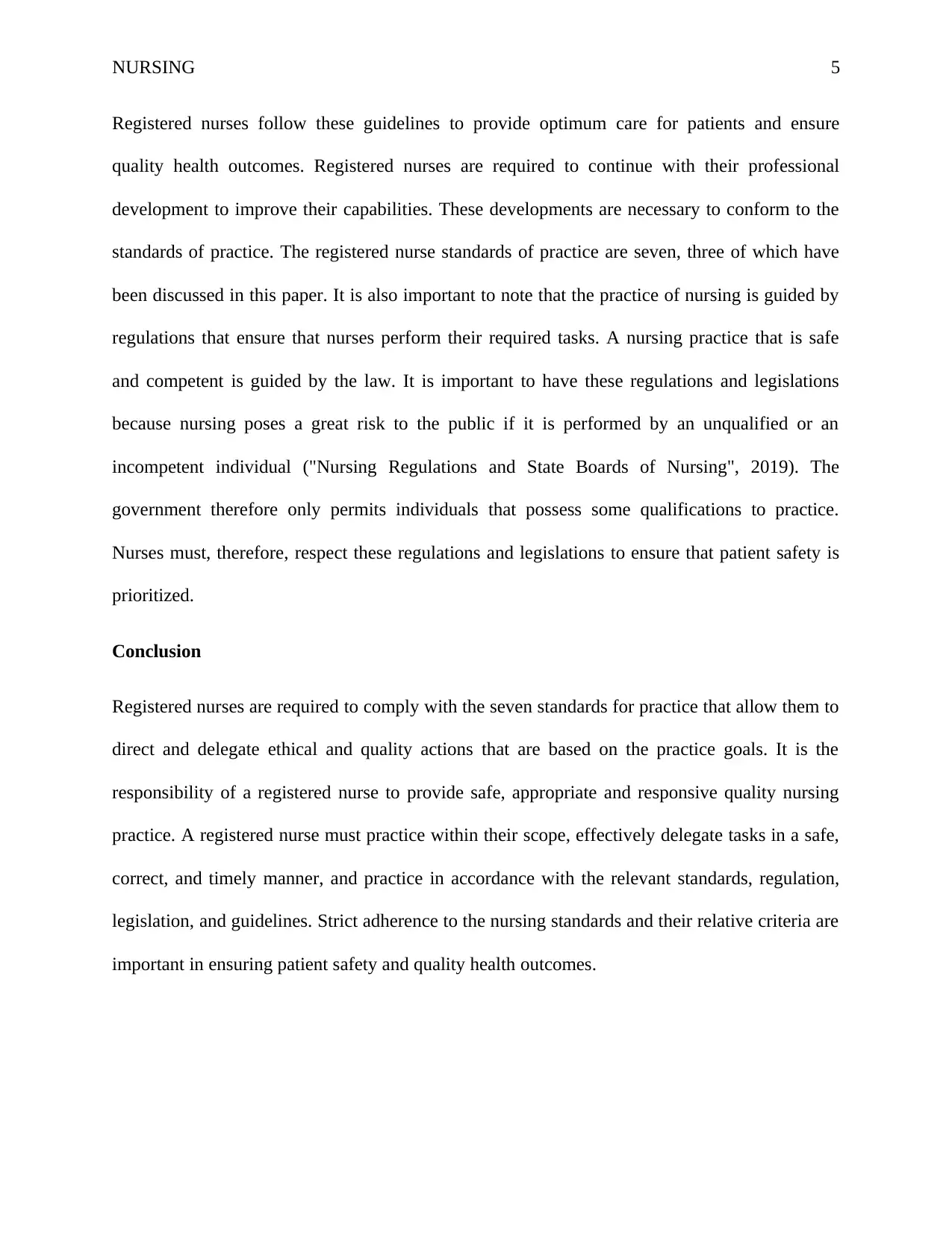
NURSING 5
Registered nurses follow these guidelines to provide optimum care for patients and ensure
quality health outcomes. Registered nurses are required to continue with their professional
development to improve their capabilities. These developments are necessary to conform to the
standards of practice. The registered nurse standards of practice are seven, three of which have
been discussed in this paper. It is also important to note that the practice of nursing is guided by
regulations that ensure that nurses perform their required tasks. A nursing practice that is safe
and competent is guided by the law. It is important to have these regulations and legislations
because nursing poses a great risk to the public if it is performed by an unqualified or an
incompetent individual ("Nursing Regulations and State Boards of Nursing", 2019). The
government therefore only permits individuals that possess some qualifications to practice.
Nurses must, therefore, respect these regulations and legislations to ensure that patient safety is
prioritized.
Conclusion
Registered nurses are required to comply with the seven standards for practice that allow them to
direct and delegate ethical and quality actions that are based on the practice goals. It is the
responsibility of a registered nurse to provide safe, appropriate and responsive quality nursing
practice. A registered nurse must practice within their scope, effectively delegate tasks in a safe,
correct, and timely manner, and practice in accordance with the relevant standards, regulation,
legislation, and guidelines. Strict adherence to the nursing standards and their relative criteria are
important in ensuring patient safety and quality health outcomes.
Registered nurses follow these guidelines to provide optimum care for patients and ensure
quality health outcomes. Registered nurses are required to continue with their professional
development to improve their capabilities. These developments are necessary to conform to the
standards of practice. The registered nurse standards of practice are seven, three of which have
been discussed in this paper. It is also important to note that the practice of nursing is guided by
regulations that ensure that nurses perform their required tasks. A nursing practice that is safe
and competent is guided by the law. It is important to have these regulations and legislations
because nursing poses a great risk to the public if it is performed by an unqualified or an
incompetent individual ("Nursing Regulations and State Boards of Nursing", 2019). The
government therefore only permits individuals that possess some qualifications to practice.
Nurses must, therefore, respect these regulations and legislations to ensure that patient safety is
prioritized.
Conclusion
Registered nurses are required to comply with the seven standards for practice that allow them to
direct and delegate ethical and quality actions that are based on the practice goals. It is the
responsibility of a registered nurse to provide safe, appropriate and responsive quality nursing
practice. A registered nurse must practice within their scope, effectively delegate tasks in a safe,
correct, and timely manner, and practice in accordance with the relevant standards, regulation,
legislation, and guidelines. Strict adherence to the nursing standards and their relative criteria are
important in ensuring patient safety and quality health outcomes.
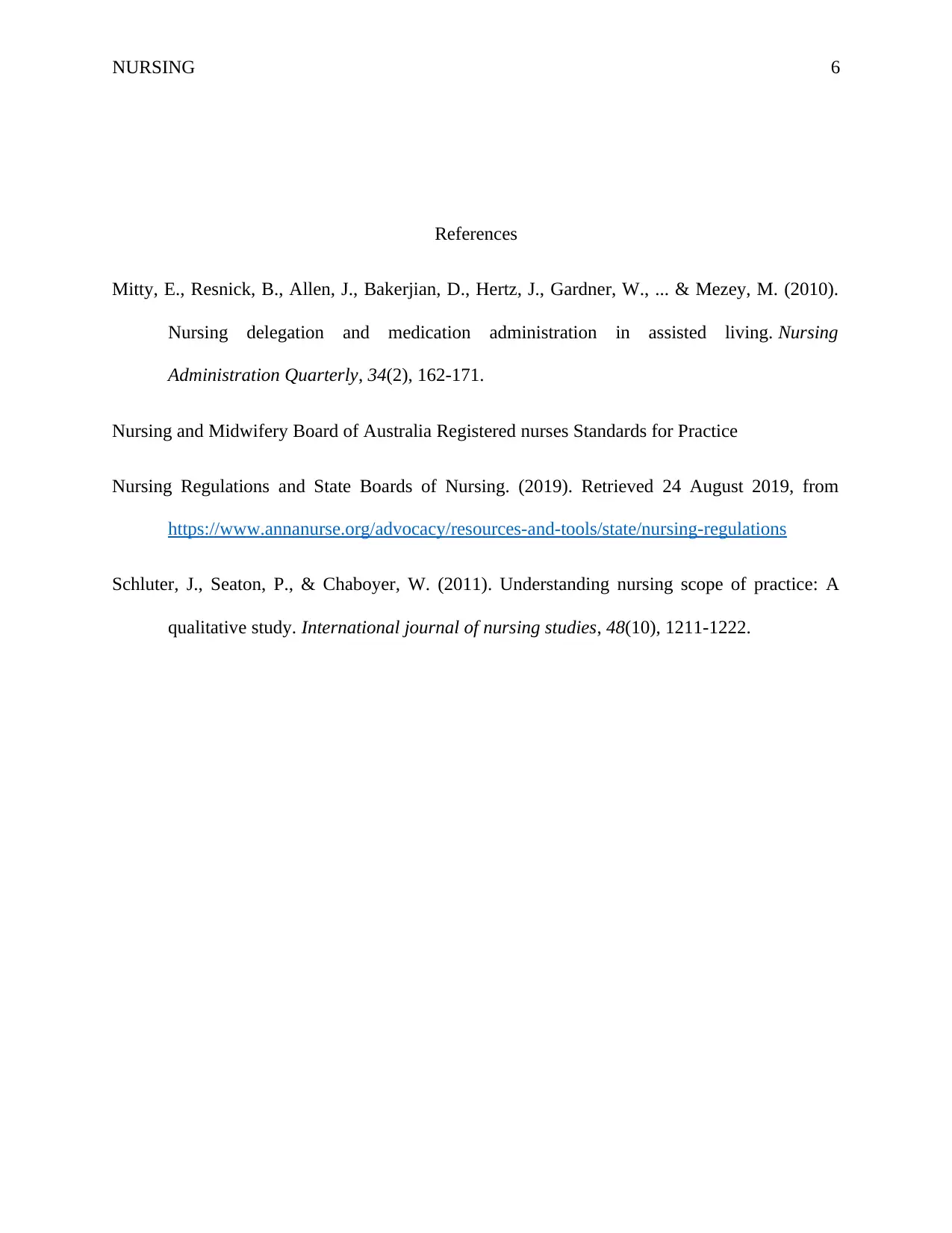
NURSING 6
References
Mitty, E., Resnick, B., Allen, J., Bakerjian, D., Hertz, J., Gardner, W., ... & Mezey, M. (2010).
Nursing delegation and medication administration in assisted living. Nursing
Administration Quarterly, 34(2), 162-171.
Nursing and Midwifery Board of Australia Registered nurses Standards for Practice
Nursing Regulations and State Boards of Nursing. (2019). Retrieved 24 August 2019, from
https://www.annanurse.org/advocacy/resources-and-tools/state/nursing-regulations
Schluter, J., Seaton, P., & Chaboyer, W. (2011). Understanding nursing scope of practice: A
qualitative study. International journal of nursing studies, 48(10), 1211-1222.
References
Mitty, E., Resnick, B., Allen, J., Bakerjian, D., Hertz, J., Gardner, W., ... & Mezey, M. (2010).
Nursing delegation and medication administration in assisted living. Nursing
Administration Quarterly, 34(2), 162-171.
Nursing and Midwifery Board of Australia Registered nurses Standards for Practice
Nursing Regulations and State Boards of Nursing. (2019). Retrieved 24 August 2019, from
https://www.annanurse.org/advocacy/resources-and-tools/state/nursing-regulations
Schluter, J., Seaton, P., & Chaboyer, W. (2011). Understanding nursing scope of practice: A
qualitative study. International journal of nursing studies, 48(10), 1211-1222.
⊘ This is a preview!⊘
Do you want full access?
Subscribe today to unlock all pages.

Trusted by 1+ million students worldwide
1 out of 6
Related Documents
Your All-in-One AI-Powered Toolkit for Academic Success.
+13062052269
info@desklib.com
Available 24*7 on WhatsApp / Email
![[object Object]](/_next/static/media/star-bottom.7253800d.svg)
Unlock your academic potential
Copyright © 2020–2026 A2Z Services. All Rights Reserved. Developed and managed by ZUCOL.





